
The Economist, Aug. 1
(posted Saturday, Aug. 1, 1998)
The cover editorial joins the chorus proclaiming the Clinton presidency is on the brink. If Kenneth Starr can persuasively link Flytrap to Whitewater, Filegate, and the like, Clinton could be toast. ... An article mocks the sophisticated models that economists are now building to predict the next currency crashes. Economists couldn't predict the Asia crisis; why should they suddenly have become more prescient? ... A story describes the work of Turkish historians debunking the myths shrouding the venerated founder of their modern state, Kemal Atatürk. Turks debate his role in the Armenian genocide and whether he was atheistic, alcoholic, and authoritarian. (A cause of the current controversy: Actor Antonio Banderas accepted, then rejected, the role of Atatürk in an coming biopic.)
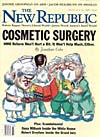
New Republic, Aug. 17 and 24
(posted Friday, July 31, 1998)
The cover story trashes health care reforms put forth by both Democrats and Republicans. GOP plans improve health care quality for the young and healthy at the extreme expense of the older and sicker. Democrats' "patient-protection" plans do slightly better but still don't go far enough--you wouldn't be able to choose your own doctor, and HMOs could still deny you treatment they deem too expensive. The only valid solution: national health care with guaranteed universal coverage. ... An essay claims the Modern Library's 100 best books list proves one thing above all else: There haven't been 100 great books written in English in the 20th century. The author's contention: Maybe 10 or 20 great books have been written in that time. (Slate has also written extensively about the Modern Library list. Click here to see Jacob Weisberg's parody, here to read Culturebox's defense, and here to read a roundup of critical responses.)
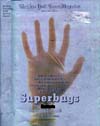
New York Times Magazine, Aug. 2
(posted Thursday, July 30, 1998)
The cover story warns that antibiotics may soon stop working: Bacteria are quickly developing immunity to even our strongest medicines. When antibiotics are no longer effective, simple medical operations could lead to deadly infections. ... A story profiles Terry Lenzner, White House gumshoe. Lenzner's private investigative group dug up dirt on Paula Jones, Richard Mellon Scaife, and "presumably ... the independent counsel." Lenzner's ease in finding sensitive personal info leads the piece to conclude that "the power once held by J. Edgar Hoover--someone who worked behind the scenes, who knew all the secrets and exerted enormous influence on public affairs--has passed into the hands of private men." ... A bizarre, six page photo essay titled "Put Your Ad Here" displays kids wearing clothing with corporate logos (Tide, Apple, Microsoft). Oddly, the first six pages of the magazine are also photos of kids wearing logo clothing (Tommy Hilfiger, Calvin Klein, DKNY), except this time the pages are paid advertisements.
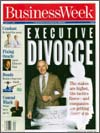
Business Week, Aug. 3
(posted Thursday, July 30, 1998)
The cover story details how costly divorce can be for rich executives. Jilted wives (the execs are overwhelmingly men) score huge court victories, winning money, property, and sometimes a large stake in their husbands' companies. Tips for execs: 1) Settle out of court; 2) make her sign a prenuptial agreement; 3) make her sign a postnuptial agreement; 4) funnel your riches to off-limits, offshore accounts. (Belize and Gibraltar are best, because they don't recognize American divorce judgments.) ... A story covers the heated battle between Coke and Pepsi for control of New York City, "one of only four U.S. markets where Pepsi-Cola outsells Coca-Cola Classic." Pepsi's advantages: Its truck drivers know the crazy traffic patterns better, and it's just bought Tropicana to compete with Coke's Minute Maid. Coke refuses to concede, directing inordinate attention to even tiny neighborhoods.
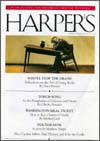
Harper's, August 1998
(posted Wednesday, July 29, 1998)
An autobiographical essay describes what it's like to owe huge amounts of money. The author knows he can't afford his kids' private schools but compulsively sinks himself further into debt just to keep up with the lifestyles of those around him. Result: ongoing fights with credit card companies, the Internal Revenue Service, and his wife. ... A truly haunting essay looks at the underworld of rape and child molestation. The author spent years covering the sex assault beat for a newspaper, and the experience left him traumatized. Conclusions: 1) Adult rape is hard for victims and investigators to deal with, but child molestation is impossible for anyone to handle. 2) "Always walk a woman to her car, regardless of the hour of the day or the night." ... From the "Index": "Fuel mileage of the QEII, in feet per gallon: 29."
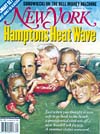
New York, Aug. 3
(posted Wednesday, July 29, 1998)
An absurd 16 page spread on summer life in the Hamptons, featuring an endless list of glitz. Highlights: expensive aircraft (Mortimer Zuckerman's Falcon 900 jet, Tommy Mottola's Sikorsky helicopter), top gardens (Kathleen Turner's, Martha Stewart's--natch), and best softball hitters (The New Yorker writer Ken Auletta, among others). Other essential information: who belongs to which country club, who throws the best parties (read: most celebrity guests), how to find good caterers, and where to hang with rap star Puff Daddy.

Time and Newsweek, Aug. 3
(posted Tuesday, July 28, 1998)
Newsweek's cover story profiles Russell Weston Jr., the Capitol gunman. A moment-by-moment chronology details the shooting itself, while background information certifies Weston's nuttiness (he talked to satellite dishes and thought he had invented a time-travel device). ... Astronaut Alan Shepard's death spurs Newsweek to profile the 12 men who have walked on the moon. Several have become deeply religious in the wake of the experience, one claiming that, while in space, he "felt the power of God as [he'd] never felt it before."
Time's cover story warns of the dangers of the E. coli germ. Recent outbreaks have stemmed from bad drinking water, apple juice, and hamburger meat. Suggestions: Wash your hands, cook your food, and don't let kids in diapers swim in public pools. ...Time hails the arrival of the one-second TV commercial. The ads aren't effective for establishing a brand, but they may work with an already familiar icon (one of the first ads is a quick clip of a Master lock getting shot by a bullet). Weirdest one-second ad: A personal-injury lawyer shouts "Hurt!" as his phone number appears on the screen.
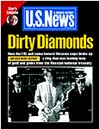
U.S. News & World Report, Aug. 3
(posted Tuesday, July 28, 1998)
U.S. News recounts a scheme to loot gold, diamonds, and antiques from the Russian state treasury and launder them through a San Francisco-based diamond dealer. Originally licensed by the Russian government to establish a Russian diamond industry, the operation deteriorated when the diamond dealer (a Russian immigrant) began taking millions for himself. The FBI and Moscow police recently busted the ring, but millions in treasure are still missing. ... A piece marvels at the Beanie Babies bubble, in which kids and speculators pay hundreds of dollars for nearly worthless stuffed animals. There are signs the bubble is about to burst.
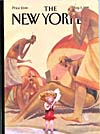
The New Yorker, Aug. 3
(posted Tuesday, July 28, 1998)
Notoriously unpleasant writer Paul Theroux chronicles his 30 year friendship with notoriously unpleasant writer V.S. Naipaul. Much of the story consists of Theroux repeating nasty things Naipaul said (e.g., to a student: "Don't write poems ... I really don't think you should. ... Now, promise me you won't write any more poems"). Their friendship recently collapsed because, Theroux speculates, Naipaul's new wife doesn't like Theroux. ... A story suggests a change in CNN's corporate culture may have contributed to the network's Tailwind debacle. Pugnacious new CNN boss Rick Kaplan was hired from ABC to boost the network's sagging peacetime ratings. His quest for sexy stories may have led his producers to cut corners. ... She's gone but not forgotten: A week after Tina Brown's farewell essay in TheNew Yorker, a staff tribute to Brown monopolizes "Talk of the Town." The gist: She was so energetic! She had such a great eye for talent! "[S]he saved The New Yorker."

Weekly Standard, Aug. 3
(posted Tuesday, July 28, 1998)
The cover story bemoans the decline of manliness and blames liberals, whose attempts to eliminate gender, coupled with the rise of the single-mother family, have bred a generation of "under-fathered" boys who are aggressive and violent but unmanly. We need to teach them the real male values: heroism and honor. ... A piece claims the new Environmental Protection Agency policy against environmental racism will actually hurt minorities. The policy discourages polluting factories from locating in areas with large minority populations. This will deprive poor blacks and Hispanics of job opportunities.
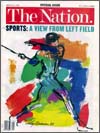
The Nation, Aug. 10
(posted Tuesday, July 28, 1998)
A special issue on sports. An essay urges New Yorkers to refuse the Yankees' current bid for a publicly funded stadium. The Yankees don't need welfare, and snubbing them will stop other teams from extorting their cities in the future. Publicly funded stadiums always transfer taxpayer money into private hands. ... A story praises Title IX for opening opportunities to women athletes. It does not hurt men's college programs unless the college opts to sink money into major men's sports (e.g., football) at the cost of minor ones (e.g., wrestling). "Overall, boys still have almost twice as many opportunities to play in school athletic programs as girls do." ... A story celebrates bowling, a blue-collar sport with a socialist heart ("handicaps" allow bowlers of different abilities to compete against one another on equal terms). Recent technological improvements (new lane surfaces, different ball materials) have made the game even better, and it's still affordable, social, and fun.
--Seth Stevenson
